Latest News
Waste fears as Afghan soldiers cash in on spent ammo
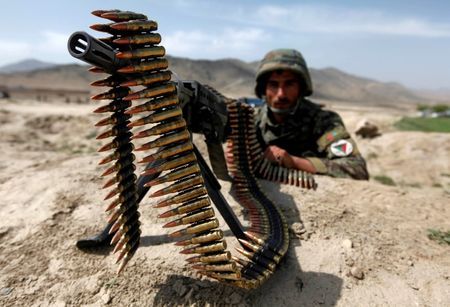
Zahir Jan, a scrap metal dealer in the southern Afghan province of Helmand, pays about 175 Afghani ($2.55) per kilo of spent cartridge casings and has no trouble finding supplies from poorly paid soldiers and policemen looking for extra cash.
If they don’t have enough on hand, he says they’re happy to fire off their weapons for 5-10 minutes until he has what he needs.
“This is a good business now and there are buyers waiting in different areas,” he said.
Along with official and media reports that some soldiers and police even sell weapons and ammunition to the Taliban, the issue illustrates a problem for commanders trying to improve controls on vital supplies like fuel and ammunition.
A senior Afghan officer in the army’s technical and weapons branch, who didn’t want to be named as he is not authorized to speak publicly, said troops in Helmand and the northern province of Kunduz fired 7,000 artillery shells in May alone.
“We asked army commanders about it and said if each shell killed only one person, we should have 3,500 Taliban dead in each province,” he said. “It’s very clear they fire aimlessly and collect the shell casings for copper and sell them.”
Another officer, a commander in Helmand who arrived in the province six months ago following a clearout of senior officers in the army’s 215th corps, estimated that up to 8 out of every 10 soldiers sold ammunition casings.
“One hundred percent, it happens,” he said, also speaking anonymously as he was not authorized to talk to the media. “The reason is the lack of a proper logistics system as well as insufficient pay and leave.”
Despite recent efforts to improve pay and conditions for Afghan soldiers, morale remains a problem, with many serving for months or even years without leave, earning around $200 a month.
The clearout of senior officers in Helmand was prompted by reports of abuse and corruption, including cases where officers stole soldiers’ pay or demanded bribes to allow them to go on leave.
Assessing just how widespread ammunition misuse is and how far the sale of cases involves deliberately or wastefully firing off ammunition rather than collecting spent cartridges from normal operations remains difficult.
The defense ministry declined to provide ammunition usage figures. But at least seven officials in different parts of the government and military said soldiers discharging their weapons purely in order to produce saleable scrap metal was a problem.
The United States spent more than $300 million from its Afghanistan Security Forces Fund on ammunition for Afghan army and police last year, Department of Defense figures show.
In a report from February, Pentagon inspectors said the systems for supplying and maintaining equipment for police and army units were “immature and unreliable”. Lack of proper controls raised the likelihood of “misuse, theft, and diversion to unauthorized purposes.”
A scandal last year involving rigged fuel contracts increased the pressure for improvements, and more attention is being given to keeping track of ammunition, which NATO officials say is a “top priority”.
“Reporting has been sketchy,” said Australian army Brigadier Scott Hicks, deputy director of the logistics and maintenance operation within the NATO-led Resolute Support training and assistance mission. “We’re getting better at it with fuel and we’re working on ammunition at the moment,” he said.
FORMS AND PAPERS
Afghan officials acknowledge there have been cases of ammunition misuse, but deny the problem is widespread.
“Several forms and papers have to be filled out to obtain ammunition and there has to be accountability for everything,” said Mohammad Radmanish, a defense ministry spokesman.
NATO officers have, however, been trying to move the Afghan army to overhaul its logistics with new computerized systems and more timely reporting from the field that would enable unusual patterns of ammunition use to be spotted more quickly.
In particular, they are trying to get away from Soviet-era supply doctrine, in which supplies are “pushed” out based on centralized estimates of likely needs.
NATO officials say the system, while relatively simple, makes it harder to see when supplies are misused. Instead, they are working to have frontline units “pull” in supplies through requests to headquarters, which must track and forecast the needs of its subordinate units.
However, they face problems convincing some Afghan commanders who are not comfortable with new methods that require more sophisticated systems and place heavy demands on a force where many soldiers are illiterate.
Kenneth Watson, civilian director of Resolute Support’s logistics and maintenance training, said more transparency was essential for foreign donors pledging billions of dollars to support Afghan forces.
“As a coalition, we have to have visibility on assets and we have no visibility with a manual-based system,” he said.
At the far end of the supply chain, such considerations weigh little for low-paid soldiers with more to worry about than foreign donors.
“Unfortunately it’s very difficult to stop,” said the commander in Helmand. Sometimes, he said, units can fire off 10,000-20,000 rounds in a single night.
“We’ll ask about casualties on our side or in the Taliban, and there isn’t even a single injury.”
Reuters

Latest News
Dried fruit market in Herat booms ahead of Eid-al-Fitr
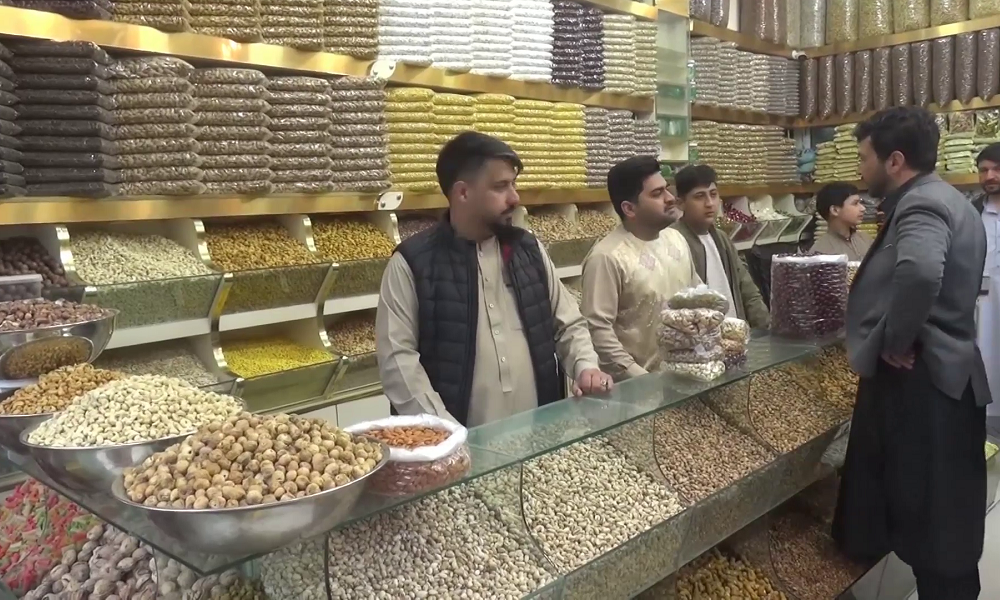
As Eid al-Fitr approaches, the dried fruit market in Herat province has thrived, with people busy purchasing Eid sweets. Families are striving to buy sweets according to their economic capabilities in preparation for this holiday.
However, this year, people’s economic situation has worsened, and they are unable to make purchases as they did in previous years.
Nevertheless, the customs and traditions of Eid compel most families to prepare for the holiday.
“Thank God, there is a lot of crowds. Sales are high. People are in the market until 1:00 AM, buying. This year, by the grace of God, prices are low, and everyone can afford to buy,” said Ayatullah Habibi, a shopkeeper in Herat.
Although dried fruit prices are cheaper this year compared to last year, many people still cannot afford to buy them.
“We are almost hopeless about our lives; there is no business, and the situation is bad,” said Ghulam Sarwar, a worker in Herat.
Meanwhile, the Herat municipality has announced the creation of a price control commission in recent days.
Herat municipality stated that dried fruit and food markets are being monitored daily by the commission members.
Meanwhile, the Union of Dried Fruit Sellers in Herat also emphasized that prices are better compared to last year.
“There is ongoing supervision in the market to ensure good quality goods and fair pricing. Any shopkeeper who sells poor-quality goods will have their shop closed,” said Abdul Ghani Qadri, the head of the Dried Fruit Sellers Union in Herat.
While many people are eagerly awaiting Eid al-Fitr, there are still many families whose primary concern is feeding their children.
Latest News
36 mining contracts inked over the past year: Mines ministry

The Ministry of Mines and Petroleum says it has signed 36 large and small mining contracts, with a total value of $1.3 billion over the past year.
Officials from the ministry stated that these contracts include 10 large mines, 25 small mines, as well as projects related to cement, salt, marble, and a major gas extraction contract with Uzbekistan, all signed with both domestic and foreign companies.
Meanwhile, economic experts have emphasized the importance of increasing investments in the mining sector for the country’s economic growth. They have stressed that priority in mining contracts should be given to domestic companies.
“It is better to prioritize domestic investors over foreign ones,” said Kamaluddin Kakar, an economic expert.
In the meantime, members of the private sector also stated that if both foreign companies and Afghan investors can partner in the mining sector, this will not only foster investment development in the country but also bring positive changes in capacity building within the mining extraction sector.
Latest News
US may ask for military equipment left behind in Afghanistan: Trump

Speaking at an event on Women’s History Month, Trump said that the Biden administration gave much of the US military equipment to Afghanistan, worth billions of dollars.
“Maybe we will have to ask for that back, although it is getting a little old now. We are building new stuff,” he said.
Trump had earlier said that if Afghanistan wants aid from America, the Islamic Emirate must return US military equipment left behind during the 2021 troop withdrawal.
However, the Islamic Emirate has said that the equipment it has seized is war spoils and will not be returned.
-

 International Sports4 days ago
International Sports4 days agoIPL 2025: Sunrisers on a batting rampage; triumph over Rajasthan Royals
-

 Latest News4 days ago
Latest News4 days agoEU says girls’ education crucial for Afghanistan’s long-term prosperity
-

 Sport4 days ago
Sport4 days agoACB names Afghanistan A squad for tri-nation series
-
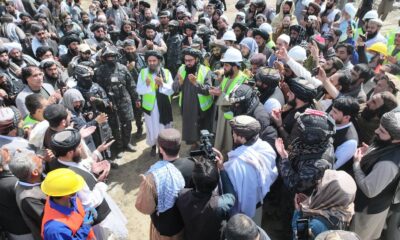
 Business5 days ago
Business5 days agoDeputy PM inaugurates launch of Arghandi Transport Terminal Project in Kabul Province
-
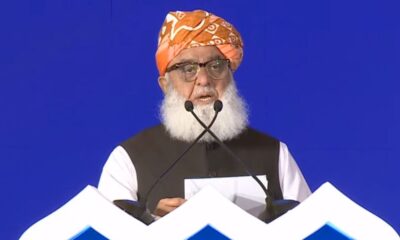
 Latest News5 days ago
Latest News5 days agoPakistan’s mistakes played significant role in rise of terrorism: Maulana Fazl-ur-Rehman
-
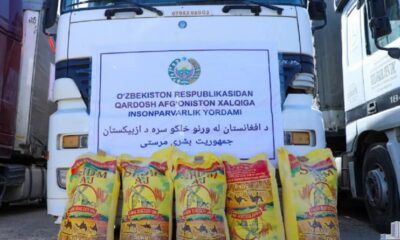
 Latest News4 days ago
Latest News4 days agoUzbekistan sends essential food aid to Afghanistan
-

 International Sports3 days ago
International Sports3 days agoIPL 2025: Last over drama; Ashutosh Sharma clinches win for Delhi Capitals
-

 Sport3 days ago
Sport3 days agoAfghanistan eliminated from Asian Beach Soccer Championship

















